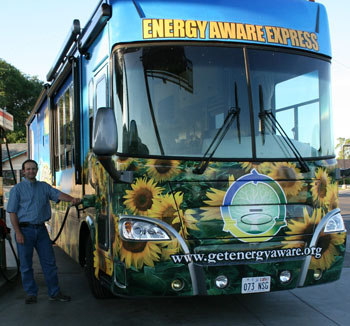(PRWEB) -- This summer, the family road trip takes on a whole new dimension for the Jenkins family of Nampa, Idaho: They are crossing the country in a biodiesel-powered RV spreading the word about the benefits of renewable energy.

"You are invited to tag along as a family from Nampa, Idaho undertakes a cross-country road trip in a biodiesel-powered motor home to raise awareness of the benefits of renewable energy."
The Energy Aware Express, powered by clean-burning biodiesel, began its cross-country journey on June 25, 2007. For a complete and continuously updated schedule, go to www.getenergyaware.org.
"We've always been interested in energy conservation and renewable energy and we wanted to combine that with public service," Christina Jenkins said. "This will be a good learning experience and help spread the message of green, clean and renewable energy."
In addition to their tour, Jenkins would like to build an online community of people who are interested in renewable energy. The Energy Aware website, www.getenergyaware.org, has a forum and a wiki so that people can share ideas, ask questions, get up to date information and take part in shaping our energy future.
Sponsors include Simplot, Eagles Consulting, BioTeam LLC, C&J Enterprises Inc. and Ferox Fuel Tabs and Jenkins is still soliciting sponsorships for this year and next. She estimates she'll need about $30,000 for the one-month trip, which will cover travel expenses, promotion, advertising and newsletter creation. Sponsors have their company name and logo professionally vinyl-applied to the side of the 2006 Gulfstream recreational vehicle. Also, sponsors are included in stops along the journey and other media events whenever possible, a link and information on the Energy Aware website. For more details on sponsorships, go to www.getenergyaware.org
A few years ago, the Jenkins family wouldn't have considered such a journey. But in 2005, their one-year-old daughter, Jessica, was diagnosed with leukemia. After almost 2 years of treatment, the family feels confident she will beat the disease, although she has to go in for monthly chemotherapy treatments. Christina said the experience was one of those events that makes a person re-prioritize their life and think about the importance of doing something significant.
"I thought that taking a tour to promote renewable energy would not only be a good experience for our family, but also great way to further something we believe in personally," Christina said. "Our country's energy future is a huge issue, more so than ever in our history, and biodiesel and renewable energy have a role to play and need to be promoted."
Biodiesel is made from ethanol (fuel alcohol distilled from plant material), vegetable or animal oil (typically soybean, corn or restaurant grease) and lye, in a process similar to brewing. Using biodiesel results in substantial reduction in pollutants such as unburned hydrocarbons, carbon monoxide and particulate matter. In addition, the exhaust emissions of sulfur oxides and sulfates (major components of acid rain) from biodiesel are essentially eliminated compared to petroleum diesel.
Diesel engines can use many oily fuels but petroleum has been the dominant source. Organic diesel (biodiesel) works very well, as it lubricates the engine. When Rudolf Diesel unveiled his engine at the World Exhibition in Paris in 1900, it ran on peanut oil. But the rapidly developing American petroleum industry produced a cheap by-product "diesel fuel" that has become the standard.
"The use of vegetable oils for engine fuels may seem insignificant today," said Diesel in 1912, a year before his death. "But such oils may become in the course of time as important as the petroleum and coal tar products of the present time."
Biodiesel is attractive for its lubricity. Petroleum diesel has usually contained sulfur to lubricate the engines, but sulfur pollutes and regulations are phasing it out. Idaho Stinker Stations are now selling a 10 percent biodiesel mix to provide added lubrication to ultra-low-sulfur fuels.
According to the European Biodiesel Board, Europe produced about 3.2 million tons of biodiesel in 2005, with Germany alone producing about half the total. By comparison, about 350,000 tons of biodiesel was produced in the U.S. in 2005 according the U.S. National Biodiesel Board - a little more than 10 percent of the amount in Europe.
"American farmers are already supplying us with biodiesel and there's much more potential," Christina said. "We're the most productive agricultural nation on earth and we could be supply a lot of our energy needs with it."

